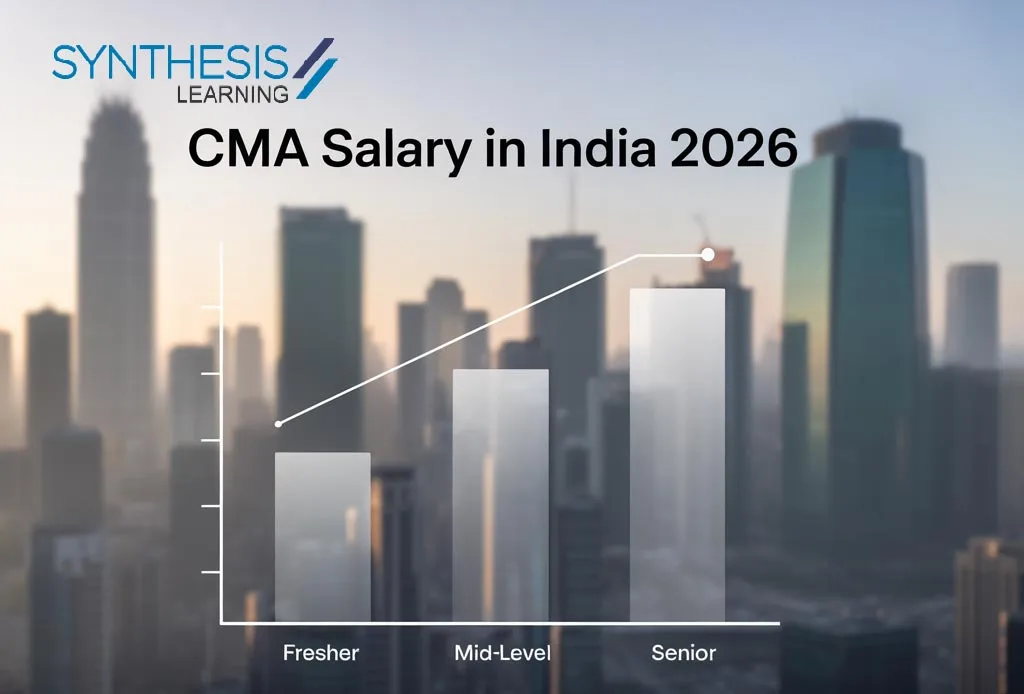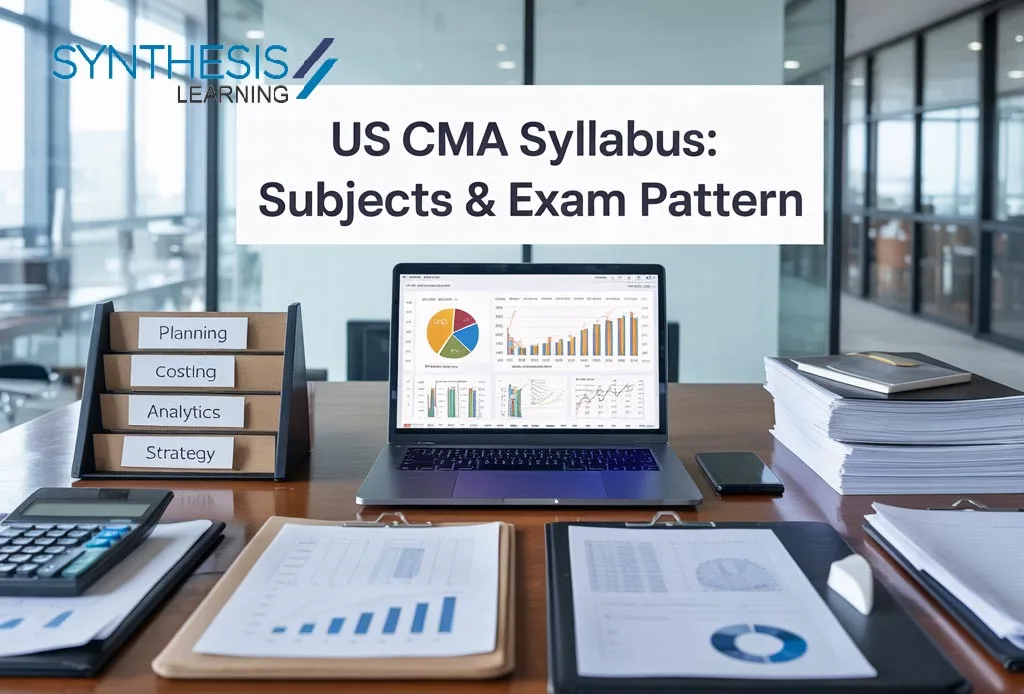US CMA vs CPA :
If you’re planning a career in accounting or finance, two globally respected designations often stand out: Certified Management Accountant (US CMA) and Certified Public Accountant (CPA). Both qualifications are governed by the American bodies and are highly valuable, but they differ significantly in their focus, eligibility, time commitment, and career outcomes.
Here’s a detailed comparison to help you make the right decision for your career path.
Professional Bodies & Global Recognition
US CMA
- Governing Body: Institute of Management Accountants (IMA), USA
- Established: 1972
- Recognition: 150+ countries
- Members: Over 140,000 globally
- Focus: Management accounting, performance management, financial planning, and analytics
CPA (USA)
- Governing Body: Administered by AICPA and NASBA (state-wise boards)
- Established: 1887
- Recognition: Highly respected in the USA, the Middle East very selective in India due to US GAAP relevance
- Focus: Financial accounting, audit, tax, and compliance
- Licensure: State-specific licensing required
While CMA is more recognised in corporate finance roles, CPA is more aligned with public accounting, auditing, and taxation.
Eligibility Criteria
| Criteria | CMA (US) | CPA (USA) |
|---|---|---|
| Eligibility | After Class 12 | Graduate with a minimum of 120 credit hours (often equivalent to a Graduation plus First year of Master’s) |
| Work Experience | 2 years of relevant experience | Varies by state; typically 1–2 years under a licensed CPA |
| Licensing Requirement | No state-wise restrictions | Must apply and qualify via a US state board |
Note: You can start CMA after 12th, pursue it alongside graduation, and receive the certificate after meeting the eligibility requirements. CPA has state-specific educational criteria, making it more complex and restrictive for Indian students.
Course Structure & Duration
US CMA
2 Parts
- Part 1 – Financial Planning, Performance, and Analytics
- Part 2 – Strategic Financial Management
- Duration: 6–12 months
- Exam Pattern: Multiple choice + Essay questions
- Flexibility: Appear anytime within three testing windows per year
CPA (USA)
- 4 Exam Sections:
- Auditing & Attestation (AUD)
- Business Environment & Concepts (BEC)
- Financial Accounting & Reporting (FAR)
- Regulation (REG)
- Duration: 12–18 months (average)
- Exam Pattern: MCQs + Simulations + Written tasks
- Testing: Year-round via Prometric centres
Syllabus & Focus Areas
US CMA Curriculum:
Part 1 – Financial Planning, Performance, and Analytics
- Financial Reporting
- Planning, Budgeting & Forecasting
- Cost Management
- Performance Management
- Internal Controls
- Technology & Analytics
Part 2 – Strategic Financial Management
- Financial Statement Analysis
- Corporate Finance
- Decision Analysis
- Risk Management
- Investment Decisions
- Professional Ethics
CPA (USA) Curriculum:
- Financial Accounting and Reporting (FAR): US GAAP, financial reporting, and accounting standards
- Auditing and Attestation (AUD): Auditing procedures, risk, evidence collection
- Regulation (REG): US tax laws, business law, ethics
- Business Environment and Concepts (BEC): Corporate governance, economics, financial management, IT
While CMA emphasises strategic financial decisions, CPA covers in-depth technical accounting, auditing, and regulatory compliance.
Exam Format & Pass Rates
| Exam Format | CMA (US) | CPA (USA) |
|---|---|---|
| Mode | Computer-based | Computer-based |
| Pass Rate | ~45–50% per part globally | ~45–50% per section globally |
| Exam Windows | Jan–Feb, May–Jun, Sep–Oct | Year-round |
| Result Declaration | 6 weeks post-exam | Score release calendar (rolling) |
Work Experience Requirements
- CMA (US): 2 years of relevant work experience in accounting or finance. Can be completed before, during, or after the exams.
- CPA: Experience requirements vary by state—usually 1–2 years under a licensed CPA in a relevant role. More regulated and state-dependent.
Competition & Flexibility
CMA (US) offers maximum flexibility. You don’t need to compete for limited seats or pass centralized exams like the CAT or GMAT. You’re only competing with yourself—your progress depends on your commitment.
CPA, in contrast, has more procedural hurdles. From evaluating your transcripts for 150 credit hours to selecting the right state board and fulfilling supervised experience, it’s a more structured and competitive process that requires planning and legal compliance, especially for Indian students.
Career Opportunities & Salary
| Aspect | CMA (US) | CPA (USA) |
|---|---|---|
| Job Roles | Management Accountant, Financial Analyst, FP&A Manager, Internal Audit, Consultant, etc. | Public Accountant, Tax Consultant, Auditor, Financial Reporting Specialist |
| Industries | Multinational Corporations, Global Capability Centres, Consulting, Manufacturing, etc. | Public accounting firms, Audit & Tax, BFSI |
| Typical Starting Salary (India) | ₹4–6 LPA | ₹6–7 LPA |
| Global Demand | High in the US, the Middle East, and India | High in the US & the Middle East; very selective in India due to US GAAP relevance |
Cost & Investment
- US CMA: ₹1.5 to ₹2 lakhs (approx.), including IMA fees, coaching, and exams.
- CPA (USA): ₹3.5 to ₹4.5 lakhs+, depending on state, evaluation, coaching, and travel (if required).
CMA is more cost-effective and faster to complete. CPA has higher entry barriers and greater costs but is deeply valued in US-based and audit-focused careers.
Final Verdict: Which One Should You Choose?
Choose CMA (US) if:
- You want to start & finish early – even during graduation.
- You want to pursue finance, management accounting, or performance analysis roles in corporations.
- You’re looking for a quicker, flexible, and cost-effective qualification.
- You prefer global finance exposure over US-specific regulations.
Choose CPA (USA) if:
- You want to build a career in auditing, taxation, or financial reporting.
- You aim to work with US-based companies or Big 4 audit firms.
- You’re okay navigating licensing and legal processes.
- You have a strong accounting base and can manage 150 credit-hour eligibility.
Ready to Choose Your Path?
Whether you’re leaning towards US CMA’s strategic agility or CPA’s audit expertise, the right preparation makes all the difference.
At Synthesis Learning, we guide you through every step—eligibility, coaching, exam prep, and beyond.
📞 Connect with our experts – 9930953567 for a personalized consultation and explore how we can fast-track your global accounting career.





